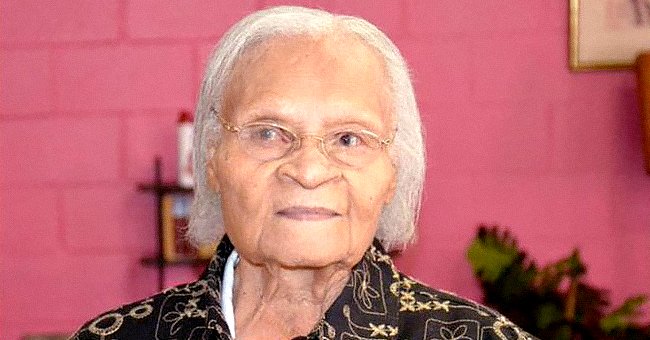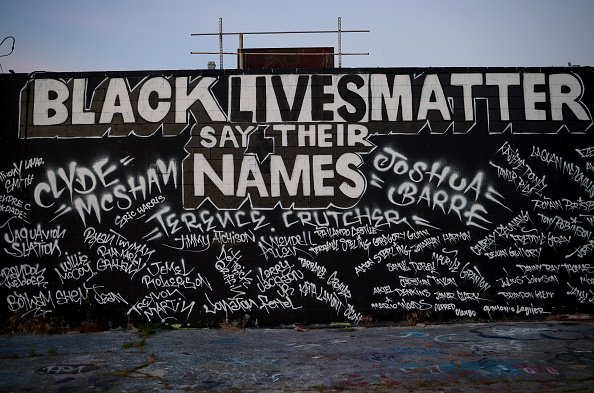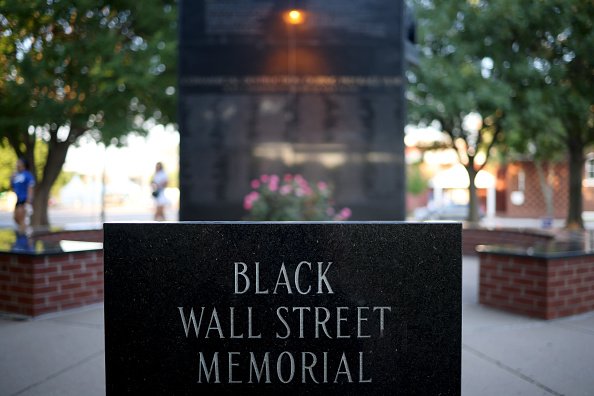
Viola Fletcher Turns 107 – Meet One of the Last Living Survivors of the Tulsa Race Massacre
Viola Fletcher, the oldest known survivor of the Tulsa Race Massacre, recently turned 107. She was just seven years old when the horrific massacre occurred.
The Greenwood community celebrated Viola Fletcher's 107th birthday. In a photo shared by the OU School of Social Work, Fletcher is seen alongside Hughes Van Ellis, another survivor.
A large part of Fletcher's life was spent in Oklahoma. She ventured to California while World War II was at its height. During her time there, she supported the war effort on the Pacific front.

A mural painted on the side of Mad Dog Liquors is shown June 18, 2020 in Tulsa, Oklahoma. | Photo: Getty Images
According to Fletcher, she worked in shipyards and built ships. She added that she had also worked on Cals-Ships and as an assistant welder in the store. The diligence with which she handled her work was admirable.
The story of Fletcher's life seems to be something out of a history book, including escaping the horrendous Tulsa Race Massacre as a child and participating in the civil rights movement.
Even though Fletcher claimed that she was very young at the time and had little memory of the massacre, she has been a visible presence in efforts to recall and acknowledge the tragedy.
Recently, Fletcher appeared at a press conference with members of the 1921 Race Massacre Centennial Commission to oppose HB 1775. The bill went into effect and banned topics of race or gender in schools.
According to her oral history, it has been 100 years since the tragedy, and Fletcher has lived a fulfilling life. During World War II, she worked in the shipyards in California with Robert Fletcher, whom she married in 1932.
On May 31, 1921, white groups attacked a Black neighborhood in Tulsa named Greenwood.

The Black Wall Street Massacre memorial is shown June 18, 2020 in Tulsa, Oklahoma. | Photo: Getty Images
Fletcher worked as an assistant welder in the shipyards, laying blocks of steel to construct ships. After the war, the couple moved to Bartlesville, Oklahoma, where they raised their three children.
In the civil suit filed last year in the Greenwood District of Tulsa, Fletcher and her fellow survivor, Lessie Randle, are plaintiffs. The lawsuit aimed to solve the problem presented by the 1921 Tulsa Race Massacre.
The suit also sought to recover benefits that defendants have received unjustly due to the massacre. Justice for Greenwood Advocates filed the lawsuit in Tulsa County District Court.
A group of plaintiffs includes Vernon A.M.E Church, the only black-owned church to survive the massacre, descendants of other victims, as well as the Tulsa African Ancestral Society.
On May 31, 1921, white groups attacked a Black neighborhood in Tulsa named Greenwood. These mobs burned down the district and murdered dozens of black people in a span of 18 hours.
The massacre began after Dick Rowland, a black teen, boarded an elevator with Sarah Page, a white elevator operator, at the Drexel building in the city. Rowland was accused of sexually assaulting Page.
